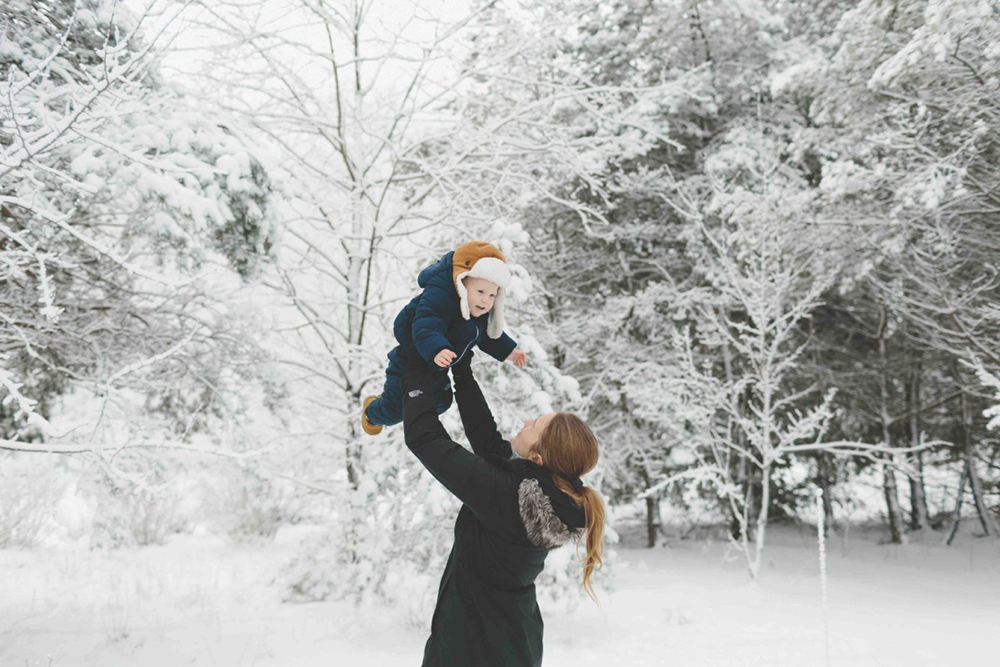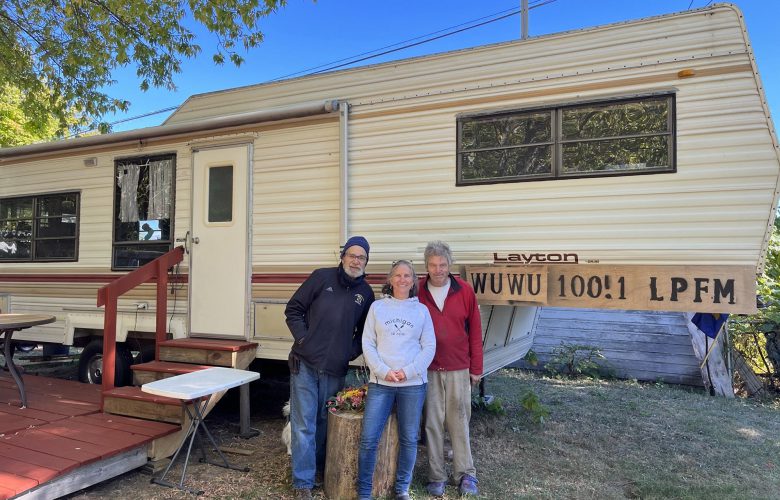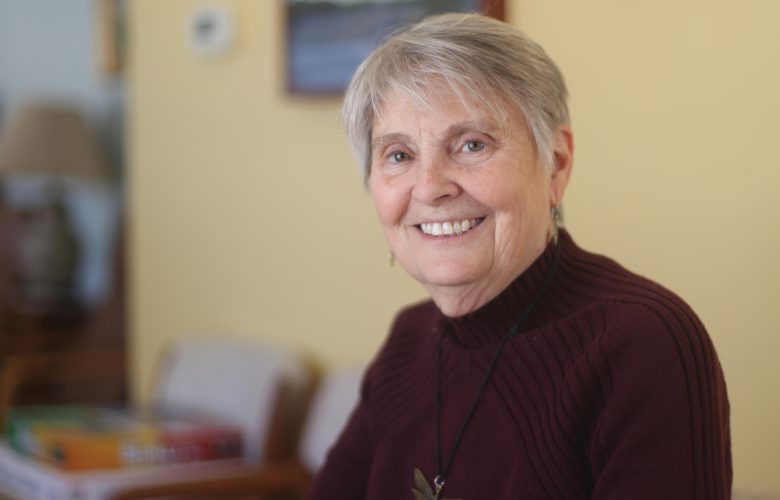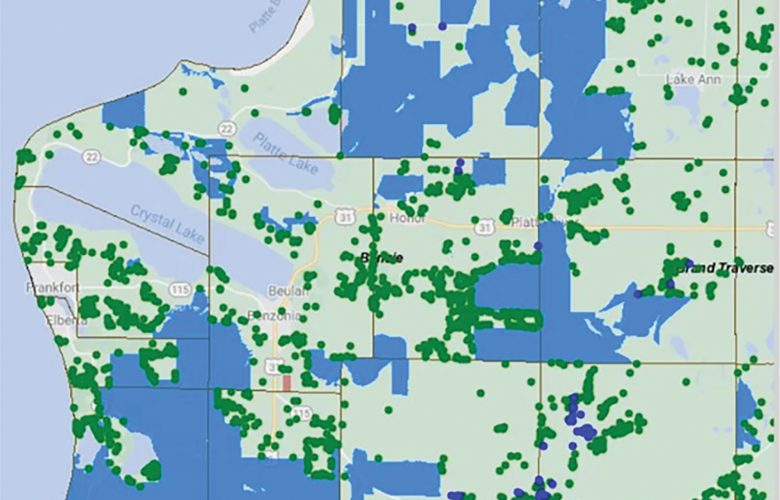A first-time mother considers how COVID-19 has affected parenting in Northern Michigan
By Mae Stier
Current Contributor
It is hard for me to imagine what parenting might look like in a typical year; how our daily routines would change if there were no pandemic.
Our son, Daniel, was not yet five months old when the novel coronavirus came to Michigan. At the time, my partner, Tim, and I were still sifting through the many transitions associated with becoming first-time parents. After realizing that it was not the best fit for our growing family, I had just closed my shop, The Blue Heron Mercantile, in Empire. We had bought a house south of Lake Ann and moved out of Empire, the village I had called home for three years and where Tim had called home his entire life.
Perhaps by March, we were beginning to find ourselves in a sort of routine again—between unpacking boxes and getting to know our new neighborhood—when “normal life” halted for what we expected would be a few weeks, a month at most. But what we hoped in March would only be a short interruption of our daily lives has undoubtedly changed our entire experience of this first year of parenting.
Even in a typical year, Northern Michigan has its challenges for young families. The affordable housing crisis continues, and because people seem more inclined to move to rural areas in the face of the pandemic, the market here is as competitive as ever.
When Tim and I began looking for our home a year ago, we had a restrictive budget—under $175,000—which required us to open the radius outside of the Empire area. Thankfully, we found a decent option, only 20 minutes from the Sleeping Bear Dunes National Lakeshore and 15 minutes from both of our parents. Proximity to family was vital for us and has proven especially important during this time, offering us a support system we would not have if our families were farther away.
Back in October 2019, as we prepared to welcome Daniel into our lives, we did not consider childcare options. As a self-employed person, I had always hoped that I would be able to reformat my days to care for my children. Of course, I had no idea the sheer difficulty that would ensue from attempting to care for my child while also trying to work from home, but in my state of hopeful ignorance, I imagined it would be manageable.
Fifteen months into motherhood—and 10 months into this pandemic—I assure you that “manageable” is not a word I would choose for the balance of caring for children while working full- or even part-time from home. “Survivable,” yes; “comical,” on the best days; “overwhelming and isolating” on the worst. Whatever word I use to describe the dance of child-caring and working from home, I imagine there are far more parents in this role today than there were a year ago.
Beyond just the difficulty of housing, parents today face limited options for childcare in the region. Our move to Lake Ann put us much closer to in-home daycare and childcare facilities than what was available in Empire, but the options are still few outside Traverse City—and there are even less during the pandemic, as some providers in the “high risk” category have chosen to take this time off. If I needed to work outside of the home, we would not have many nearby choices and would likely need to commute for childcare, which is a reality for many families.
Parenting support is about more than just childcare, however. When we moved out of Empire, I knew that we would make our way back to the village often, and especially planned to make Thursdays our “Empire day.” For years, the Glen Lake Community Library has hosted a story hour with Joanne “Yogi” Beare, a gift to Glen Lake-area parents. (Yogi was a childcare provider for years; Tim used to attend her daycare in Empire when he was a child. He fondly remembers the “goodbye song” that she would sing to them each day, a song she still sings at the end of story hour at the library.)
Unfortunately, only a handful of story hours have occurred this year, as we all do our best to keep our community safe.
Before the latest surge of COVID-19 cases in our region, the library and Yogi worked together to create a safe environment for story hour to happen: with limits to the number of people allowed, with masks in place, and with everyone at a distance. I took Daniel to story hour one week, and he was able to see other children his age, really, for the first time. It was refreshing to see other parents, for us to all shuffle through the doors laden with diaper bags and car seats, our eyes tired but smiling above our masks.
I realized that day that story hour and other children’s groups are as much for the parents as the children, offering us the opportunity to connect with people who understand the whirlwind of our days. Daniel crawled around on the floor after Yogi read us all a book, followed by a couple of other young boys, and he laughed at the game of chase with other children—a game he had previously only played with his dad or his dog.
As a first-time mother, I have realized more fully the importance of community support, and that support is more critical now than ever. So many of us are feeling weighed down by the heaviness of this year. The reality that many of our children have not seen their grandparents or had the opportunity to make friends. That children have not been in school, or maybe the fact that they have been in school, and we worry about everyone’s safety.
New parenthood can be isolating in an average year, but this year gives a whole new meaning to that sense of isolation. The help that was so vital to me in the earliest days of being a mom—a neighbor dropping off a meal, or my mom doing our laundry—may not be as accessible to new parents, because of the pandemic.
The help that I need now—someone to watch Daniel for a few hours so I can work, a necessity to pay our bills—is continuously weighed against the risk of seeing anyone outside of our household. Daniel has not had a babysitter besides my parents, who are in our “pod,” since the summer, and before that, his Aunt Stevie was the only other caretaker he has had. Would it have been different in a year without the pandemic?
It is not easy to know the answer to that question, as this year’s reality is all we have known as parents. Would there be more playdates? Date nights? A regular sitter? Would my work be consistent enough to require more difficult decisions to be made around childcare? Certainly, we would have needed more assistance without the pandemic during the summer, a season when I typically am photographing weddings and families frequently. This year, with a number of those events postponed, my workload lightened just enough to allow me to care for Daniel without necessitating outside help, though I certainly could have still used it.
The reprieves that parents usually find from hectic days with young children—a nice meal out with their partner, a weekend where the kids go to Grandma’s, a playdate for your child while you connect with another parent—have been limited this year. Many of our support systems as parents have been removed, forcing us to balance more than any one set of parents should have to manage alone.
Parents this year have become teachers, while also caring for toddlers, while also continuing to work. Perhaps in an average year—one with the promise of a night out or a visiting grandparent to break up the responsibility—these many roles would be less exhausting. But when there is no end in sight, it is simply overwhelming. It turns out that parents need support systems, whether those systems exist in public schools, at a library story hour, or with friends and family.
Of course, we understand the importance of limiting our interactions with others during this current season. We know how easily and quickly this virus has spread throughout our country, something that could have been prevented with more stringent restrictions early on. Even still, we mourn what we have missed this year and look forward to a future where we can be supported by—and likewise support—our neighbors through physical presence.
Despite the difficult days, I am so grateful for the opportunity to work at home while raising my son, even if I envision that we will begin to add in one or two days of childcare a week, once it feels safe to do so.
For now, I look forward to the time when we can have our Empire Thursdays—story hour, maybe hot cocoa at Grocer’s Daughter Chocolate, and a hike with a friend.
Meanwhile, we continue to struggle to do the only dance we know: a clumsy balance of work and childcare during a worldwide pandemic, with limited systems of support. Despite our two-left feet in this unexpected era, we have learned the dance is a little easier—and a little more fun—when set to a Whitney Houston soundtrack, and we have added joy to many of our days by ending them dancing together in the living room.
For parents who are looking for access to childcare options in our region, the Benzie-Leelanau District Health Department (BLDHD) can be a great resource for connecting you to available providers. The BLDHD provides the Parenting Communities program to our region, facilitating many playgroups, when it is safe to do so. Great Start to Quality, a resource within the Michigan Department of Education, also helps families to find the best learning centers for young children. Additionally, our local libraries are an excellent resource for parents with young children, as they host story hours and other events for families—a number of those programs are currently on hold, due to the pandemic, but some have programming available via Zoom or Facebook. Benzonia, Betsie Valley (Thompsonville), Glen Lake, Interlochen, Suttons Bay, and Traverse Area District libraries are all offering online story hours for children.
Mae Stier is a writer and photographer living in Inland Township. She lives with her partner, Tim Egeler, and their one-year-old son, Daniel. You can find more of Stier’s work, including her collection of poetry, “Lake Letters,” via her website MaeStier.com. A version of this article first published in the Glen Arbor Sun, a Leelanau County-based semi-sister publication to The Betsie Current.




